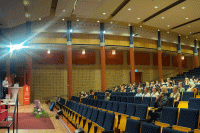Researchers at the University of Gothenburg now associate elevated levels of the protein galectin-1 with increased risk of developing type 2 diabetes about 18 years later. At the same time, this protein seems to be a protective factor for the kidneys among type 2 diabetes patients at high risk for diabetic nephropathy.
Findings of the study, a collaboration with researchers at Lund University, have been published in the journal Diabetologia. The researchers point to both negative and positive links between the protein galectin-1 and type 2 diabetes. In a general population, galectin-1 may be associated with an increased risk of diabetes, but in patients with a subtype of diabetes that increases the risk of kidney damage, galectin-1 appears to be beneficial, as patients with high galectin-1 levels in their blood suffer less kidney damage.

“This is probably not as strange as it might sound. My own personal theory is that the actions of galectin-1 found in the kidney are linked to inflammatory processes, whereas the actions of galectin-1 in the adipose tissue appear to be largely linked to metabolic processes. Thus, we can expect to see different mechanisms at work and different outcomes for the same protein,” says Emanuel Fryk, one of the study’s lead authors. Fryk is a resident physician in general medicine and a doctoral student at Sahlgrenska Academy, University of Gothenburg.
Counteracts inflammation
Galectin-1, a protein expressed by fat cells as well as other cells, is involved in both the regulation of inflammation and the function of fat cells in the body. Five years ago, the research team at the University of Gothenburg presented results from a study of individuals with newly diagnosed type 2 diabetes and healthy controls. They proposed that the protein could be involved in pathophysiological mechanisms in the adipose tissue in type 2 diabetes development. Later the team also showed that the protein was linked to higher insulin levels in the blood of one thousand participants in a study known as the Swedish CArdioPulmonary bioImage Study (SCAPIS). The protein was associated with increased insulin levels after adjusting the analysis for known risk factors in type 2 diabetes, such as obesity, age, and gender.
Increased risk of illness
In the Malmö Diet and Cancer Study, the researchers have now been able to confirm that galectin-1 plays a significant role in disease development in type 2 diabetes. In this large population study, participants are also followed over time. The study incorporates analyses of blood samples from more than 4,000 participants, collected between 1991 and 1994. Galectin-1 levels in blood samples was analyzed in order to assess the relation to risk of developing type 2 diabetes, around 18 years after the sample was initially collected. The authors do not propose that galectin-1 should become a new tool in primary care to predict who will develop diabetes, but this is a step forward in better understanding the disease.
“This is an important piece of the puzzle in the research field on why obesity is such a big risk factor for the disease. It is a new clue for scientist trying to find out exactly what happens in the body of individuals with obesity who later develop type 2 diabetes.”
Protection from renal failure
Type 2 diabetes is a complex disease, in which many factors contribute to the development of the disease. One of the most serious complications is chronic kidney disease, which about half of those who have type 2 diabetes develop. The organ damage is permanent and can lead to premature death. For that reason, researchers also looked more closely at those afflicted with kidney disease and found links to galectin-1 also in this context. By combining genetic analyses and measurements of galectin-1, they could examine the genetic link between galectin-1 and developing diabetes and kidney disease in another Scania based study, but only including individuals with diabetes: the All New Diabetics in Scania (ANDIS) study. The ANDIS study has previously proposed that diabetes can be separated into five subgroups, with one group at significantly higher risk of diabetic renal disease. The subgroup, labeled SIRD (severe insulin-resistant diabetes), is characterized by excess weight and severe insulin resistance.
Based on analysis from the ANDIS study, the researchers now show that elevated levels of galectin-1 may offer protection against kidney damage for this group of patients.
“In two large population-based cohorts in southern Sweden, we demonstrate that galectin-1 is linked to renal function and has potentially prophylactic effects against renal failure among some patients with type 2 diabetes. This puts a new candidate on the table that should be studied as a potential target when developing future pharmaceuticals.”
Title: The role of circulating galectin-1 in type 2 diabetes and chronic kidney disease: evidence from cross-sectional, longitudinal and Mendelian randomisation analysis; https://doi.org/10.1007/s00125-021-05594-1
BY: ELIN LINDSTRÖM











